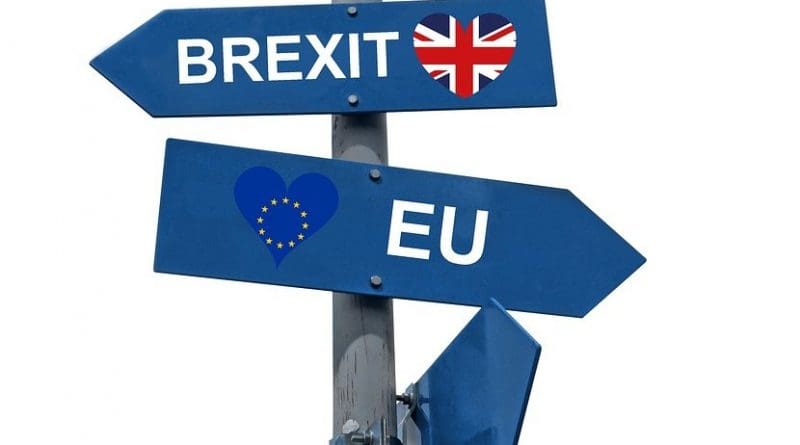Theresa May Has No Choice But To Soften Brexit Blow As Much As Possible – OpEd
By Arab News
By Cornelia Meyer*
Michel Barnier held a press conference on Wednesday, explaining where the EU stood on the various issues regarding Brexit. He was upbeat that an agreement might be possible by Oct. 17, just in time for the EU leaders to review and sanction it during their next summit. He said the negotiating teams were 80 to 85 percent “there.”
British negotiators call this stage of the negotiations “the tunnel,” indicating that one needed to get through the darkness in order to see the light at the end. That is where the unity and optimism ended. Barnier criticized UK Prime Minister Theresa May’s Chequers plan, while Northern Ireland remains the big sticking point. Barnier made it quite clear that it was unacceptable to the EU for the UK to separate the free movement of goods from the free movement of services. He argued that the two were indivisible and there could not be any cherry-picking — period.
Therein lies the conundrum for Northern Ireland. A hard border between Ulster and the Republic has to be avoided to preserve the peace, stability and free flow of goods and people. This was achieved when the Good Friday Agreement ended decades of sectarian hostilities in 1998. Barnier gets that. His counterproposal was a free border on the Irish isle, but checks in the Irish Sea. However, a status where Northern Ireland is treated differently from the rest of the UK is not acceptable to May.
It is even less acceptable to the leader of the Democratic Unionist Party (DUP), Arlene Foster, who has threatened to cancel her party’s confidence-and-supply agreement with the Tories. The votes of her 10-strong faction in Westminster are what props up the PM’s minority government. Foster even threatened to vote down the Budget later this month if the negotiations did not go her way, and this could potentially bring down the government. On Wednesday night, the DUP gave May a taste of things to come by abstaining from a vote on the government’s agriculture bill.
May would like to resolve these issues with a backstop plan, which would keep the UK in a customs union with the EU until a permanent trade deal could be agreed. That might be a pragmatic and elegant solution. Alas, it is not acceptable to the Brexiteers in her party such as Jacob Rees-Mogg and Boris Johnson. The latter opined that the proposal would turn the UK into “a permanent EU colony.” What is really needed here, in theory, is a simultaneous execution of the withdrawal agreement and a final trade deal. Unfortunately this is not on the cards.
By now, the PM may be at a loss as to what she is to do. If she agrees to Barnier’s proposal of border controls in the Irish Sea, the DUP are out and her government might well be toppled. If she proposes a lingering in the customs union until a final trade deal is agreed, the Brexiteers in her party will vote down any agreement with the EU when it comes before parliament.
Labour could potentially help bring the EU deal over the finishing line by voting for it. That looks very unlikely too. Shadow Foreign Secretary Emily Thornberry has set the bar unrealistically high, saying Labour will only vote for an agreement with the EU if it yields the same benefits as though Britain remained in the single market and the customs union. Why would the EU agree to that? As Barnier put it — the UK wanted to leave, he did not ask them to.
Thornberry quite relishes the prospect of bringing down the government and calling for an election, where she feels her Labour Party would do well. She also favours an extension of the duration of Article 50 — the famed paragraph in the Treaty of Lisbon that was used to trigger the Brexit process. Nobody has so far tested whether that would be an option from an EU perspective. In the meantime, Labour’s Shadow Brexit Secretary Sir Keir Starmer bemoans that neither May nor the government ever asked for his input to evaluate the government’s position or see what would be acceptable to Labour.
The prime minister is boxed in. Whichever way she moves, she will incur the wrath of one faction or another. This makes it less likely that a final withdrawal agreement will pass Parliament and more likely that the UK might have to leave without a deal. An extension of Article 50 remains the wildcard.
Business is still eagerly waiting for clarity in order to position itself for the post-Brexit world. Life will go on after Britain leaves the EU; the question is at what expense to the economy, investment, jobs, living standards, security of supplies of food and medicines, etc. The UK also needs clarity around what will happen to its position under EU agreements with third parties. It emerged last week that the US may block the UK’s bid to rejoin the Government Procurement Agreement (GPA), which gives EU enterprises access to a $1.7 trillion market. This agreement has so far brought UK companies revenues of about £68 billion ($90 billion) a year. The likes of Rolls-Royce would be badly affected because the GPA gives them access to contracts in both the defense and civilian sectors.
Brexit will be costly to the UK whatever its final shape or form. At the Conservative Party conference, May made a good point to Rees-Mogg when she said: “A Brexit that might make Britain stronger 50 years from now is no good to you if it makes your life harder today.” That is precisely the point: Brexit will affect the real lives of real people, which makes it imperative to soften the blow.
* Cornelia Meyer is a business consultant, macro-economist and energy expert. Twitter: @MeyerResources

